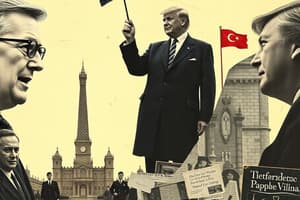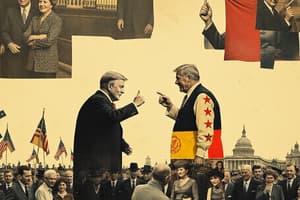Podcast
Questions and Answers
What is one of the main goals of long coalitions formed by parties in government?
What is one of the main goals of long coalitions formed by parties in government?
- To allow members to compete against one another
- To ensure members continue to vote together (correct)
- To enable members to vote independently
- To reduce legislative sessions
What consequence might Mr. Business face if he betrays the coalition after Bill 1 passes?
What consequence might Mr. Business face if he betrays the coalition after Bill 1 passes?
- Strengthening the coalition
- Ruining the coalition (correct)
- Increased popularity among voters
- Gaining more legislative power
How do parties help individual members win elections?
How do parties help individual members win elections?
- By causing confusion among voters
- Through branding and common ideas (correct)
- By increasing voter registration fees
- By preventing external funding
What role do parties play in influencing public opinion?
What role do parties play in influencing public opinion?
What is one of the functions of party organization?
What is one of the functions of party organization?
Which statement reflects the view of political scientists regarding the goals of parties?
Which statement reflects the view of political scientists regarding the goals of parties?
What percentage of Americans reportedly have a clear preference when asked about their political affiliation?
What percentage of Americans reportedly have a clear preference when asked about their political affiliation?
What key problem do representatives face in the principal-agent relationship?
What key problem do representatives face in the principal-agent relationship?
What percentage of UNF students identify as Democratic?
What percentage of UNF students identify as Democratic?
Which of the following social issues had the highest support for legalization among UNF students?
Which of the following social issues had the highest support for legalization among UNF students?
What is the predominant view of UNF students regarding climate change?
What is the predominant view of UNF students regarding climate change?
How do moderates typically differ from ideological extremes according to the content?
How do moderates typically differ from ideological extremes according to the content?
What is the percentage of UNF students who support the pathway to citizenship for all immigrants?
What is the percentage of UNF students who support the pathway to citizenship for all immigrants?
In terms of economic issues, what percentage of UNF students support an increase in the federal minimum wage?
In terms of economic issues, what percentage of UNF students support an increase in the federal minimum wage?
What proportion of UNF students are classified as moderate in general ideology?
What proportion of UNF students are classified as moderate in general ideology?
What is the main attitude of UNF students towards the Second Amendment?
What is the main attitude of UNF students towards the Second Amendment?
What is a common consequence of individuals selecting their preferred media?
What is a common consequence of individuals selecting their preferred media?
What should be prioritized when consuming news media?
What should be prioritized when consuming news media?
Which of the following does NOT typically help in discerning real news from opinion?
Which of the following does NOT typically help in discerning real news from opinion?
What is a primary reason for the loss of gatekeeping ability in media?
What is a primary reason for the loss of gatekeeping ability in media?
Why is it important to understand the difference between consumption of news and belief?
Why is it important to understand the difference between consumption of news and belief?
Which of the following best represents an effective strategy for engaging with media?
Which of the following best represents an effective strategy for engaging with media?
What aspect of polling was noted as an error in both the 2016 and 2020 elections?
What aspect of polling was noted as an error in both the 2016 and 2020 elections?
Identifying which type of experts is essential for reliable news consumption?
Identifying which type of experts is essential for reliable news consumption?
What is an example of de facto racism?
What is an example of de facto racism?
What does the term 'One-drop Rule' refer to?
What does the term 'One-drop Rule' refer to?
Which of the following was NOT a consequence faced by newly freed slaves after Reconstruction?
Which of the following was NOT a consequence faced by newly freed slaves after Reconstruction?
What was a significant finding of Alexis de Tocqueville about the American culture in terms of social structure?
What was a significant finding of Alexis de Tocqueville about the American culture in terms of social structure?
What was one of the early tools that helped to propagate racism in society?
What was one of the early tools that helped to propagate racism in society?
Which principle is NOT a widely accepted component of the American Creed?
Which principle is NOT a widely accepted component of the American Creed?
What was the main outcome of redlining?
What was the main outcome of redlining?
What does the term 'worse than slavery' signify in the context of black incarceration?
What does the term 'worse than slavery' signify in the context of black incarceration?
What aspect of American identity is contested regarding the English language?
What aspect of American identity is contested regarding the English language?
Which demographic is least likely to value English as important to being 'truly American'?
Which demographic is least likely to value English as important to being 'truly American'?
Why was the early end of Reconstruction significant for freed slaves?
Why was the early end of Reconstruction significant for freed slaves?
What percentage of Americans believe English is very important to their identity as 'truly American'?
What percentage of Americans believe English is very important to their identity as 'truly American'?
What psychological concept contributes to the formation of ingroup-outgroup distinctions?
What psychological concept contributes to the formation of ingroup-outgroup distinctions?
Which group was primarily identified as fortune-seekers by de Tocqueville?
Which group was primarily identified as fortune-seekers by de Tocqueville?
Which principle ensures that government protects numerical minorities from the majority?
Which principle ensures that government protects numerical minorities from the majority?
What does American Exceptionalism imply?
What does American Exceptionalism imply?
What was the primary purpose of the Bipartisan Campaign Reform Act of 2002?
What was the primary purpose of the Bipartisan Campaign Reform Act of 2002?
What identifies a Super PAC's main advantage over regular PACs?
What identifies a Super PAC's main advantage over regular PACs?
Which of the following donations requires full identification to the FEC?
Which of the following donations requires full identification to the FEC?
What did the Supreme Court rule regarding the limitations set by the Bipartisan Campaign Reform Act?
What did the Supreme Court rule regarding the limitations set by the Bipartisan Campaign Reform Act?
What is Tullock's Puzzle in the context of political funding?
What is Tullock's Puzzle in the context of political funding?
Why do organizations like the NRA tend to give most of their donations to members with 'A' ratings?
Why do organizations like the NRA tend to give most of their donations to members with 'A' ratings?
Which of the following statements best describes spending by corporations after the Citizens United ruling?
Which of the following statements best describes spending by corporations after the Citizens United ruling?
What is a major disadvantage of Super PACs?
What is a major disadvantage of Super PACs?
Flashcards
Long Coalitions in Government
Long Coalitions in Government
Legislators forming long-term alliances to achieve common goals.
Party Goals (Long Coalitions)
Party Goals (Long Coalitions)
Maintain unity and avoid splits among party members.
Party Organization
Party Organization
Parties improve election chances, build brand recognition, mobilize volunteers, and provide career paths.
Party in Electorate
Party in Electorate
Signup and view all the flashcards
Party as Heuristic
Party as Heuristic
Signup and view all the flashcards
Party in Society
Party in Society
Signup and view all the flashcards
Principal-Agent Problem (Parties)
Principal-Agent Problem (Parties)
Signup and view all the flashcards
Party Influence on Elections
Party Influence on Elections
Signup and view all the flashcards
De Facto Racism
De Facto Racism
Signup and view all the flashcards
One-Drop Rule
One-Drop Rule
Signup and view all the flashcards
Echo Chambers
Echo Chambers
Signup and view all the flashcards
Ingroup-Outgroup Distinction
Ingroup-Outgroup Distinction
Signup and view all the flashcards
Outgroup Stereotyping
Outgroup Stereotyping
Signup and view all the flashcards
Fake News
Fake News
Signup and view all the flashcards
News Media Heuristics
News Media Heuristics
Signup and view all the flashcards
Black Codes
Black Codes
Signup and view all the flashcards
Loss of Gatekeeping
Loss of Gatekeeping
Signup and view all the flashcards
Sharecropping
Sharecropping
Signup and view all the flashcards
Redlining
Redlining
Signup and view all the flashcards
News Media Consumption
News Media Consumption
Signup and view all the flashcards
Trained Experts
Trained Experts
Signup and view all the flashcards
How did redlining impact wealth accumulation?
How did redlining impact wealth accumulation?
Signup and view all the flashcards
Polling Accuracy
Polling Accuracy
Signup and view all the flashcards
Polling Biases
Polling Biases
Signup and view all the flashcards
American Creed
American Creed
Signup and view all the flashcards
Classical Liberalism
Classical Liberalism
Signup and view all the flashcards
Egalitarianism
Egalitarianism
Signup and view all the flashcards
Popular Sovereignty
Popular Sovereignty
Signup and view all the flashcards
Minority Rights
Minority Rights
Signup and view all the flashcards
American Exceptionalism
American Exceptionalism
Signup and view all the flashcards
English Language & American Identity
English Language & American Identity
Signup and view all the flashcards
English Language Importance - Demographics
English Language Importance - Demographics
Signup and view all the flashcards
Super PACs: Unlimited Spending
Super PACs: Unlimited Spending
Signup and view all the flashcards
Super PACs: Donor Anonymity
Super PACs: Donor Anonymity
Signup and view all the flashcards
Super PACs: Independent Control
Super PACs: Independent Control
Signup and view all the flashcards
Super PACs: Steep Penalties
Super PACs: Steep Penalties
Signup and view all the flashcards
Super PACs: Outsider Influence
Super PACs: Outsider Influence
Signup and view all the flashcards
Does Money Buy Policy?
Does Money Buy Policy?
Signup and view all the flashcards
Tullock's Puzzle: Money in Politics
Tullock's Puzzle: Money in Politics
Signup and view all the flashcards
NRA Spending: Persuasion or Loyalty?
NRA Spending: Persuasion or Loyalty?
Signup and view all the flashcards
Ideological Thinking in Politics
Ideological Thinking in Politics
Signup and view all the flashcards
Impact of Ideology on Voting
Impact of Ideology on Voting
Signup and view all the flashcards
Social Liberalism Among Students
Social Liberalism Among Students
Signup and view all the flashcards
Economic Views of Students
Economic Views of Students
Signup and view all the flashcards
The 'Moderate' Identity
The 'Moderate' Identity
Signup and view all the flashcards
Moderation as a Heuristic
Moderation as a Heuristic
Signup and view all the flashcards
Symbolic vs. Operational Moderation
Symbolic vs. Operational Moderation
Signup and view all the flashcards
Understanding Political Moderation
Understanding Political Moderation
Signup and view all the flashcards
Study Notes
Lecture Summaries
-
10/14 - Lecture 12 Political Parties:
- Founders missed or underestimated the importance of political parties, viewing them as "factions."
- Key figures like Madison, Washington, and Jefferson held different perspectives on the role of parties in government
- Political parties emerged as a necessary element to facilitate legislative coalitions.
- Early party systems like the Federalists and Democratic-Republicans formed around contrasting viewpoints on governance.
-
10/16 - Lecture 13 Polarization:
- Ideological polarization is a significant societal trend.
- Mass polarization isn't widely present, but elite-level polarization is increasing.
- Demographic, geographic, and ideological sorting contribute to polarization.
- The causes of polarization encompass historical, cultural, and social contexts, including the effect of media.
-
10/23 - Lecture 14 Political Psychology:
- Ideology is a set of values and principles influencing desired political outcomes.
- Common ideological labels exist (liberal, conservative, libertarian, etc.), but public's understanding can be imperfect
- Voting behavior is shaped more by factors like party affiliation (heuristics, etc.) than by ideology.
- Factors affecting political behavior may include political psychology, personality assessments, group affiliations.
-
10/21 - Lecture 15 The Media, Old and New:
- Media outlets have diverse goals, driven by elements like profit and partisanship.
- The accuracy of media sources may be more concerning than apparent bias
- Traditional and social media outlets often cater to specific perspectives/audiences
- An understanding of media incentives helps in evaluating information bias
-
10/28 - Lecture 16 Attitudes and Polling:
- Polling has practical use in understanding public opinion.
- Increased accuracy through aggregation is important.
- Response rates and sample size are critical concerns regarding polling accuracy.
- Social desirability bias can impact polling results' reliability.
-
10/30 - Lecture 17 Voting, Campaigns, and Elections:
- Voting styles and eligibility criteria have evolved over time.
- Voter turnout varies across demographics and political systems.
- Voter turnout is impacted by factors including ease of participation, the importance of an election, and societal trust.
- Campaign effects may be relatively minor, but significant in low-level elections or in situations with more engagement among electorate
-
11/4 - Lecture 18 Race and Ethnicity:
- Social constructs often shape racial and ethnic categories, rather biological differences.
- Historic and contemporary systems have created inequalities (e.g., black codes, redlining).
- Mass incarceration and racial bias in the criminal justice system represent significant racial disparities.
-
11/6 - Lecture 19 Immigration:
- Immigration history has been marked by periods of open and restricted immigration.
- Various factors such as economic conditions, social unrest, and political instability has historically influenced immigration patterns.
- Contemporary issues relating to immigration include paths to citizenship, sanctuary laws, and refugee policies..
-
11/20 - Lecture 20 American Political Culture:
- American political culture is a complex blend of ideals (e.g. liberty, equality, etc.) and behaviors.
- Ideals are often debated and contested, often in relation to social issues and identity, while the political culture itself is influenced by demographic (religious, ethnic, etc.) differences. Various historical figures have offered varied perspectives on American political culture.
-
12/2 - Lecture 22 Money in Politics:
- Historical regulation of political money, with early regulations proving ineffective
- Laws have been put in place at different points in history, and faced various challenges.
- Current regulations and limitations on political contributions are designed to mitigate potential for undue influence by special interests.
-
12/4 - Lecture 23 Economic Inequality:
- Economic inequality in the U.S. has risen in recent decades, with various theories concerning the causation of inequality
- Unequal distribution of wealth is impacting various systems, like poverty and education.
-
Lecture 24 & 25 - Democratic Accountability:
- Public opinion is often poorly understood by political actors, leading to poor policy decisions
-
Case Studies:
- Numerous case studies on political interest groups, including those related to business, gun rights, and civil liberties, have been highlighted.
-
Additional Topics:
- Additional topics regarding social movements, voter turnout and their impact on political outcomes and the impact of political campaign tactics are also covered in notes.
Studying That Suits You
Use AI to generate personalized quizzes and flashcards to suit your learning preferences.




